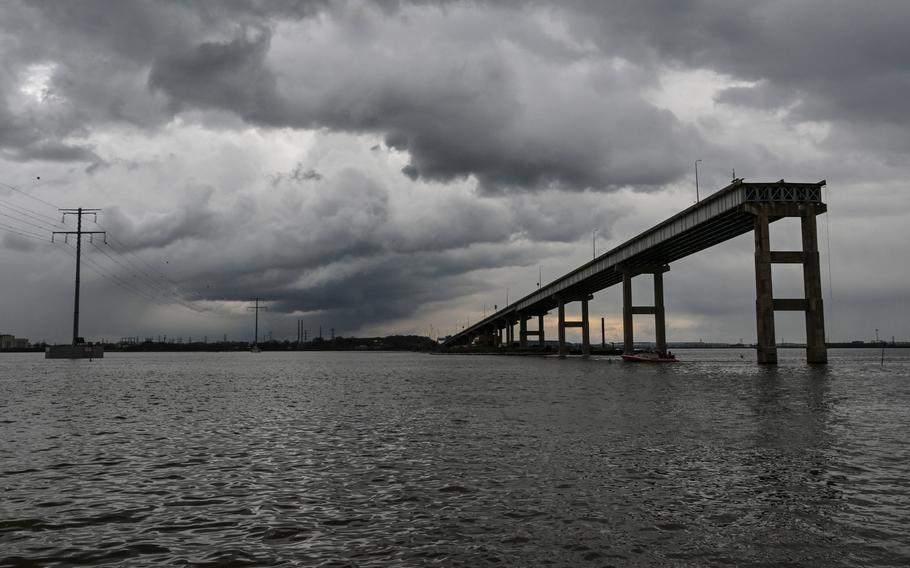
A section of the Francis Scott Key Bridge stands intact as workers dismantle the collapsed portion of it on April 4 in Baltimore. (Ricky Carioti/The Washington Post)
The Biden administration asked Congress on Friday for $3.1 billion in emergency funding to rebuild major highways, including Baltimore’s Francis Scott Key Bridge, which collapsed in March when it was struck by a cargo ship.
Federal salvage authorities have cleared the vital waterway en route to Baltimore’s buzzing harbor, and roughly 80 percent of commerce has returned, according to Maryland officials. But the road, which carried roughly 30,000 cars a day, could remain closed for years. Immediately after the collapse, President Biden pledged that the federal government would pay the full rebuilding cost.
The collapse killed six construction workers on the bridge who were fixing potholes.
“The day the Francis Scott Key Bridge collapsed, the president made clear that the administration would use the full force of the federal government to help the city of Baltimore every step of the way,” Shalanda Young, director of the Office of Management and Budget, wrote in a letter Friday to House Speaker Mike Johnson (R-La.)
“Since then, the administration has engaged in a significant rescue and salvage effort and worked to reopen the channel, marshaling a full range of federal agencies led by a Unified Command in close collaboration with the state of Maryland. However, these efforts represent only the first stage of what will be a significant rebuilding effort.”
The request for Baltimore comes as part of a larger domestic spending package, totaling close to $4 billion, meant to top off federal coffers after western wildfires and ahead of what could be a historically dangerous hurricane season.
The White House in October asked Congress for $50 billion for child care, high-speed internet access and natural disaster recovery, and more than $100 billion for Ukraine, Israel, Taiwan and the U.S. defense industrial base.
Congress in April passed the foreign aid, but has not seriously considered the domestic spending request. On Friday, the administration asked Congress to approve an additional $700 million for community housing, infrastructure and resiliency grants nationwide; $112.5 million for the Coast Guard and Army Corps of Engineers, which have led the Baltimore recovery effort; and $25 million for workers displaced by the bridge collapse, wildfires and storms.
The $3.1 billion would fund the Transportation Department’s emergency relief fund, a large pool of money administered by the Federal Highway Administration to reimburse states for costs to rebuild major roadways. The account is vastly underfunded: In April, it had a $2.1 billion backlog of projects and only $890 million on hand. New funding could support the Baltimore bridge, highways in Hawaii destroyed by fires in 2023 and other emergency transportation projects.
The funding broadly has bipartisan support. Rep. Tom Cole (R-Okla.), chair of the House Appropriations Committee, has said he supports federal funding for Baltimore and visited the site of the bridge collapse with Maryland Gov. Wes Moore (D).
“People around the country should, I think, breathe a sigh of relief that our supply lines were only temporarily disrupted,” Rep. Kweisi Mfume (D-Md.), who represents downtown Baltimore, said in an interview. “And people around the country should realize that, as an American tragedy, it’s been good for me to see, at least, how many people on both sides of the aisle are touched by it.”
But government spending bills in Congress are on a tenuous path. Annual funding bills for the government expire on Sept. 30, and the GOP-controlled House is advancing party-line bills with many steep funding cuts for fiscal 2025. That legislation will be dead on arrival in the Democratic-controlled Senate, probably forcing Congress to consider a stopgap bill to temporarily preserve federal funding at current levels until after the November election.
Maryland’s congressional delegation, which has outsize representation on Congress’s spending committees, hopes to attach bridge recovery funding to that temporary legislation, Mfume said.
Maryland officials have made rough estimates that the replacement bridge could cost between $1.7 billion and $1.9 billion, based on recent construction work in the state and similar projects around the country. They are seeking a team of private contractors to plan, design and build a new bridge to open no later than Oct. 15, 2028. Those contractors will develop detailed cost proposals as the specifics of the bridge’s design take shape.
In May, the chairman of the House Transportation Committee, Rep. Sam Graves (R-Mo.), said he wants a “very firm estimate before we take any further action on the cost-sharing.” Currently, Maryland officials said they stand to have 90 percent of rebuilding costs covered by the federal government.
State officials said the certainty that would come with bumping up that reimbursement rate to 100 percent would help speed its reconstruction efforts, which are critical for smoothing the flow of goods coming in and out of the port and to aid Baltimore-area drivers suffering through disaster-related traffic snarls.
Maryland officials also note that federal taxpayers will get hundreds of millions of dollars back from insurance and other payments stemming from the ship strike, though that process could take years.
Michael Laris and Erin Cox contributed to this report.